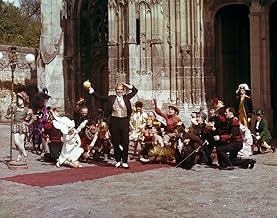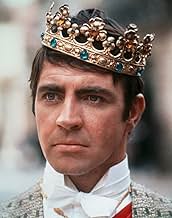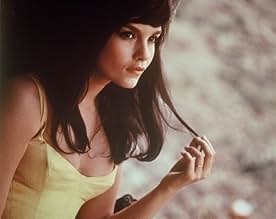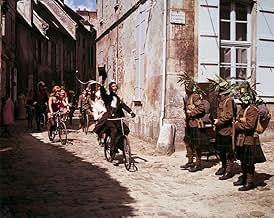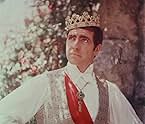Kurz vor Ende des 1. Weltkriegs soll der schottische Soldat Charles Plumpick in einer französischen Kleinstadt eine Bombe entschärfen. Der Ort wird von den Insassen einer Nervenheilanstalt r... Alles lesenKurz vor Ende des 1. Weltkriegs soll der schottische Soldat Charles Plumpick in einer französischen Kleinstadt eine Bombe entschärfen. Der Ort wird von den Insassen einer Nervenheilanstalt regiert, die den Neuzugang zum "Herzkönig" krönen.Kurz vor Ende des 1. Weltkriegs soll der schottische Soldat Charles Plumpick in einer französischen Kleinstadt eine Bombe entschärfen. Der Ort wird von den Insassen einer Nervenheilanstalt regiert, die den Neuzugang zum "Herzkönig" krönen.
- Regie
- Drehbuch
- Hauptbesetzung
- Un Officier Anglais
- (as Paolo Capponi)
- L'aliéné-docteur
- (Nicht genannt)
- Le Gabalou
- (Nicht genannt)
- Un aliéné
- (Nicht genannt)
- Un aliéné
- (Nicht genannt)
Empfohlene Bewertungen
But personal memories apart, it is stunning to watch how French director Philippe de Broca managed to fuse hilarious fun and melancholy reflection in a mold that is an incredible mixture. There is fairy tale, commedia dell'arte, circus, slapstick, comedy, romance - and World War I carnage. Among the supporting roles, the cast features some of the foremost French actors of those times; and it is obvious that they enjoyed every bit of it, especially as they put in a number of biting quips along with marvelous cameos.
This is what happens: For one day Private Charles Plumpick (Alan Bates) becomes, rather against his will, the mock king of a group of lunatics. This motley crowd have escaped from their asylum and have temporarily taken possession of a deserted town in Northern France between the 1918 front lines. Eventually Plumpick owes it to his lunatic friends that he survives when his Scottish battalion and their German counterpart meet in battle. There seems to be no way out of the madness of war. But don't miss the penultimate scene! (Rumour has it that it was censored in the American version at the time...)
My favorite scene is when young, innocent Coquelicot takes the shortest way from the brothel (well - it's a French film, isn't it?) to the town hall to meet her loved one, the King of Hearts - using two telegraph wires as a tightrope.
Why the film was a flop in its own country, and why neither a DVD or at least a video tape is available in France, I simply do not understand. Is it because only the French speak French but the Scots speak English and the Germans speak German? (Note de Broca himself, very early in the film, in a 5 second cameo as Private Adolf Hitler!) No need to worry - there are subtitles to help you along. Actually the DVD recently on sale in the USA *is* the original French version! Subtitled, and uncensored, to be sure.
I cannot deny that the film does have its shortcomings. The story is somewhat inconsistent, there seem to be goofs galore, continuity is lousy. But then it seems that de Broca had to make do with a lousy budget, too. And what he has created is essentially a dream which opposes to the nightmare of war a vision of humanity. In such dreams inconsistency, goofs and lousy continuity do not really matter. So it is still 10 out of 10.
As the much-put-upon martial ornithologist, It's not just because Bates is the only English member of the cast that one is aware of some awkwardness in his casting. For English cinema goers in particular, familiar with his career, his usual jocular masculinity is hard to reconcile with an child-like character, swept along by events. Those who remember Bates and Oliver Reed wrestling nude in 'Women in Love' (1962) from the same period, or his cocky Vic in 'A Kind of Loving' (1962), may bulk at Bates portraying such a confused innocent. Having said that, Bates' actual performance is balanced and restrained, all of a piece with the rest of the cast.
'King of Hearts' is primarily an ensemble piece. Many of the film's most delightful moments spring from the fancy-filled and flirtatious lunatics who quickly fill the streets, shops and occupations left by the fleeing villagers, their interaction with each other, and Plumpick. This world of fantasy is curtailed by the village walls, which physically as well as mentally encircle their environment. Outside is reality (no matter how ludicrously it is presented), conflict, death. Inside the walls is harmony of sorts, life celebrated. This distinction between outside and inside is made clear in the film. As soon as Plumpick attempts to ride a horse back into the real world for help, the music and the mass accompaniment of him by the inmates has to end until he is obliged to return.
As the 'King of Hearts' Plumpick is at the center of his motley 'people', as well as of Coquelicot's (Geneviève Bujold) affections. Once he awards himself his name, in a panic and on the run, his 'subjects' call out for him. He is promptly 'crowned' (both by banging his head, inducing his initial confusion, and though acquiring his 'kingship'). He is awarded a bride, and accepted as an unique traveller into the society of the amiably mad. Their acceptance of him anticipates the final scene of the film, when a chastened Plumpick re-admits himself into their company, having rejected the larger insanity of warfare.
It's fitting in a way that the least successful parts of the film lay outside of the village, where comic stereotypes replace whimsy and the comedy is drawn with much broader strokes. In particular Colonel MacBibenbrook (Adolfo Celi, better known as Emil Largo in 'Thunderball') is uncomfortably close to parody, and his part would have been much better cast with an actor like Trevor Howard who could excel with a line in ironic bombast. The Germans fare no better and, although amusing and lightweight in their capers, one misses the delicacy with which the lunatics are portrayed. One suspects that De Broca associates more with the geniality of the insane, as we all do given the options, and this sympathy is reflected on screen
Tellingly, the lunatics are not completely oblivious to the hostile world which surrounds them, although they are content to ignore the immediate threat of destruction and Plumpick's warnings. At the end of the film, once the opposing forces have symbolically destroyed themselves, Marcel says:'I'm tired of this game, let's go back to our rooms'. With deliberate sadness, they divest themselves of their play robes and return to their asylum, a divestment scene at the same time quiet, serious and eminently sane. It is clear that they are mad - but not crazy.
summer of 2004. This is a great fable--which during the 1980s might have
seemed dated, but now is more relevant than ever. It is a great meditation on war. As a movie, the circus-like atmosphere and characters combine to form a grand entertainment. We get seduced by the world of childlike imagination and sense of wonder we see in the inmates. We embrace them. Great
philosophical moments abound--all surrounded by beautiful colors, wonderfully funny moments and a gorgeous music score. The final scene is such a classic-- and takes the audience by such surprise--one goes out of the film absolutely
exhilarated. A funny, charming and ultimately profound film.
An all-time foreign film classic, "Le Roi De Coeur," aka "King Of Hearts," is a marvelous movie, full of sweetness, charm, and both clever comedy & fine drama that also comments very well on the stupidity of war. Alan Bates, who sadly passed away recently, is simply wonderful as Private Plumpick, as is the lovely Genevieve Bujold as the young patient named Poppy that Plumpick falls for, and Adolfo Celi is quite funny as Plumpick's stuffy superior officer. The rest of the film's big ensemble cast, whether playing the asylum patients or various soldiers, are all excellent, too.
The only thing that stops "King Of Hearts" from being perfect is that it *could* very well be argued that the insane asylum patients in this movie aren't...well, *insane* enough. They may speak strangely to one another or to Private Plumpick, but, for the most part, they act & behave quite coherently. But other than that, "King Of Hearts" is a very charming foreign film, and one of the very best films of the late, great Alan Bates. Definitely seek this one out.
Wusstest du schon
- WissenswertesWhile the film was a flop with critics and audiences in France, it was an unexpected cult success in the USA, running for years in Boston repertory film houses circa 73-76. Midnight showings around the country made it an early cult film, like Rocky Horror Picture Show (1975), Eraserhead (1977), El Topo (1970), Blumen ohne Duft (1970), etc...
- PatzerThe stairs/ladder Plumpick uses to climb to the top of the blockhouse appear out of nowhere.
- Zitate
[last lines]
Le Duc de Trèfle: The most beautiful journeys are taken through the window.
- Crazy CreditsThe credits rise and then fall to coincide with the sound of a large clock.
- VerbindungenReferenced in Der Soldat James Ryan (1998)
- SoundtracksLa Valse Tordue
Written and Performed by Georges Delerue Et Son Orchestre
Top-Auswahl
- How long is King of Hearts?Powered by Alexa
Details
- Erscheinungsdatum
- Herkunftsländer
- Sprachen
- Auch bekannt als
- King of Hearts
- Drehorte
- Senlis, Oise, Frankreich(insane asylum and town square scenes, Senlis is 55 km north of Paris)
- Produktionsfirmen
- Weitere beteiligte Unternehmen bei IMDbPro anzeigen
Box Office
- Bruttoertrag in den USA und Kanada
- 17.646 $
- Eröffnungswochenende in den USA und in Kanada
- 3.443 $
- 25. Feb. 2018
- Weltweiter Bruttoertrag
- 18.130 $
Zu dieser Seite beitragen



![Trailer [OV]](https://m.media-amazon.com/images/M/MV5BOTgyNWQ0NTctZWY1Mi00NzY1LTljNWItMWFlNjI2MDMzM2NmXkEyXkFqcGdeQXRyYW5zY29kZS13b3JrZmxvdw@@._V1_QL75_UY281_CR79)

